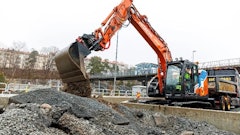Dear Editor,
The reaction of the asphalt industry of Colorado to your June/July issue touting the benefits of our friends at the City and County of Denver self-performing its asphalt production and paving services was one of utter disbelief. A committee comprised of CAPA members and Denver worked throughout 2005 to assess the costs and efficiency of the Denver operation. Our detailed analysis showed how flawed their accounting was.
The "cost savings" and "efficiency" of city/county operations included in your articles are unsubstantiated in an equitable comparison against published bids and grossly misleading. We are very interested in learning from Denver how it can be 20 percent more efficient and cost effective than private industry when they have a work force of 190 people that produces and places 200,000 tons of HMA a year. For a contractor, 200,000 tons is typically two months of production and two crews — not a year and a battalion. Amazing!! Why couldn't they prove that to the committee over many months of work on that specific subject? Denver is innovative all right — innovate in its cost accounting.
Simply put, the City and County of Denver claims a 20 percent ($4.50 per ton) savings over private industry in the supply of asphalt. However, they have no advantage over private industry in materials — they purchase aggregate and liquid asphalt from outside suppliers; they have no advantage from an operations standpoint — they place fewer tons per crew and with more people than private industry; and they have no advantage from a production standpoint — the operational costs of the plant are similar to a contractor's cost.
It is unthinkable to suggest a 20-percent savings over private industry knowing that there are 22 stationary HMA plants in the seven county metro Denver area that are all breathing down on the market with a combined capacity in excess of over 5 million tons of asphalt production per year. It is the toughest and most competitive asphalt market in Colorado. The only advantage Denver has is in their COST ACCOUNTING and how they present the cost data. Surely the savings is not in operations or quality control. Note the "what not to do" photo on page 14 — no mix in the hopper, no truck, only one roller trailing way behind the paver, and broadcasted mix in the new mat. Not the most stellar example of quality, efficiency or innovation!
We have had an on-going dialogue with Denver for some time on the issue of a cost comparison of contractor versus in-house asphalt services. We have yet to come up with an "apples to apples" comparison. It becomes difficult when they can easily adjust any and all input values (e.g. number of personnel, overhead, production levels, etc.) to improve the look of the numbers and appear more competitive.
We have also discussed structuring contracts with asphalt suppliers to ensure priority truck loading and consistent supply if Denver purchases greater asphalt quantities from private industry. It doesn't seem to have helped. What's more, the City of Denver shuts down its asphalt plant for four months in the winter, which is extremely cost-inefficient. Moreover, the City's plant has a capacity to produce double to triple the amount of asphalt it actually produces, another incredible inefficiency in owning and operating the plant.
Selling the plant with a lease/purchase option for the land and contracting out for asphalt services would provide Denver with a very attractive option. But as your article indicated, they couldn't do that because of their "extensive history" and "proud tradition." Maybe it has a little to do with the fact that the Street Maintenance Division has to keep 190 people busy for eight months so they can plow snow in the winter.
The role of government is to "serve and protect." That's why nearly every public agency needs a maintenance program and most are very good at what they do. However, there is a big difference between pothole patching and emergency repairs and using taxpayer dollars to compete unfairly against private industry for both asphalt production and placement activities while justifying your existence through the presentation of cost data and the need to have an army to plow snow in the winter.
For Asphalt Contractor magazine to be an advocate of asphalt "best practices" for the asphalt contractor, I would suggest that in the future you are more careful on promoting agency self-performance of asphalt services. That way you would avoid the disservice of doing what you did to the asphalt industry of Colorado with the June/July issue. That is, promoting a one-sided view on an issue where there is clearly a second viewpoint that went completely unreported. Maybe a follow-up article could be titled, "Denver Paving — The Mile High Concern" and explain why Denver is the only agency within a 300-mile radius that has its own asphalt plant.
Thomas Peterson, P.E., Executive Director, Colorado Asphalt Pavement Association (CAPA)
[CAPA represents the 12 million-ton asphalt industry of Colorado www.co-asphalt.com.]
Editor's note: Asphalt Contractor promotes the use of bituminous asphalt by reporting on production, placement and preservation issues.















